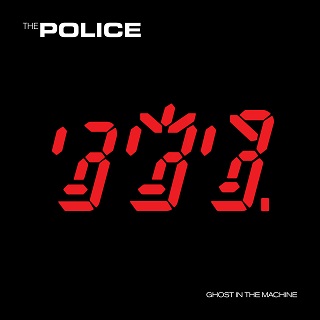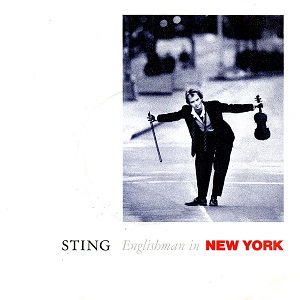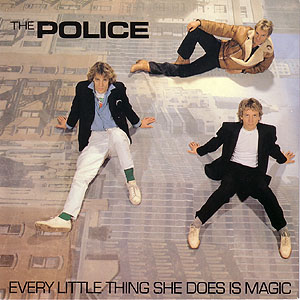
The Police were an English rock band formed in London in 1977. Within a few months of their first gig, the line-up settled as Sting, Andy Summers (guitar) and Stewart Copeland, and remained unchanged for the rest of the band's history. The Police became globally popular in the late 1970s and early to mid 1980s. Emerging in the British new wave scene, they played a style of rock influenced by punk, reggae, and jazz.

Outlandos d'Amour is the debut studio album by British rock band the Police, released on 3 November 1978 by A&M Records. Elevated by the success of its lead single, "Roxanne", Outlandos d'Amour peaked at No. 6 on the UK Albums Chart and at No. 23 on the Billboard 200. The album spawned two additional hit singles: "Can't Stand Losing You" and "So Lonely".

Reggatta de Blanc is the second studio album by British rock band the Police, released on 5 October 1979 by A&M Records. It was the band's first release to top the UK Albums Chart and features their first two UK number-one singles: "Message in a Bottle" and "Walking on the Moon". In early 1980, the album was reissued in the United States on two 10-inch discs, one album side per disc, and as a collector's edition with a poster of the band.

Zenyatta Mondatta is the third studio album by British rock band the Police, released on 3 October 1980 by A&M Records. It was co-produced by the band and Nigel Gray.

Ghost in the Machine is the fourth studio album by British rock band the Police. The album was released on 2 October 1981 by A&M Records. The songs were recorded between January and September 1981 during sessions that took place at AIR Studios in Montserrat and Le Studio in Quebec, assisted by record producer Hugh Padgham.

Every Breath You Take: The Singles is the first compilation album by the Police, released in 1986. In 1990, the album was repackaged in New Zealand, Australia and Spain as Their Greatest Hits with a different cover.

"Roxanne" is a song by British rock band the Police. The song was written by lead singer and bassist Sting and was released as a single on 7 April 1978, in advance of their debut album Outlandos d'Amour, released on 3 November. It was written from the point of view of a man who falls in love with a prostitute. When re-released on 12 April 1979, the song peaked at No. 12 on the UK Singles Chart.

"Walking on the Moon" is a reggae song by British rock band the Police, released as the second single from their second studio album, Reggatta de Blanc (1979). The song was written by the band's lead vocalist and bassist Sting. It went on to become the band's second No. 1 hit in the UK.

"Englishman in New York" is a song by English singer-songwriter Sting, from his second studio album ...Nothing Like the Sun, released in October 1987. Branford Marsalis played soprano saxophone on the track, while the drums were played by Manu Katché and the percussion by Mino Cinélu.

"Message in a Bottle" is a song by British rock band the Police. It was released as the lead single from their second studio album, Reggatta de Blanc (1979). Written by the band's lead singer and bassist Sting, the song is ostensibly about a story of a castaway on an island who sends out a message in a bottle to seek love. Having received no response for a year, he despairs, believing that he is destined to be alone. The next day, however, he sees "a hundred billion bottles" on the shore and realizes that there are more lonely people like him.

The Very Best of... Sting & The Police is a compilation album issued by A&M Records on 3 November 1997, containing a mix of Police songs and Sting's solo works. It originally featured one new track, a remix of the 1978 song "Roxanne" by rap artist Sean "Puffy" Combs. The album was reissued in 1998 by PolyGram International with "Russians" removed and three added tracks: "Seven Days", "Fragile", and "De Do Do Do, De Da Da Da". The original European version issued by A&M Records of this compilation instead included these tracks without removing "Russians".

"Every Little Thing She Does Is Magic" is a song by the British rock band the Police from their fourth studio album, Ghost in the Machine (1981). It was a hit single that reached the top of the charts in the United Kingdom in November 1981 and hit No. 3 on the US Billboard Hot 100 chart that same year.

"De Do Do Do, De Da Da Da" is a song by the Police, released as a single in 1980. Released as the British second single from the album Zenyatta Mondatta, the song was written by Sting as a comment on how people love simple-sounding songs. The song was re-recorded in 1986 as "De Do Do Do, De Da Da Da '86" but not released until 1995.

The Police is a self-titled compilation album released by the Police on 5 June 2007, to both celebrate the 30th anniversary of their recording debut and accompany their reunion tour. It contains 28 tracks over two discs, a mixture of hit singles and fan favourites. All the singles are included, with the exception of "Secret Journey" and '"Don't Stand So Close to Me '86". International editions contain two bonus tracks, "The Bed's Too Big Without You" from Reggatta de Blanc and "Rehumanize Yourself" from Ghost in the Machine. The band's non-studio album debut single, "Fall Out", originally recorded in 1977, is also included; other than Message in a Box: The Complete Recordings (1993) the song has never been included on any other Police album.

The English rock band the Police has released five studio albums, three live albums, seven compilation albums, fourteen video albums, four soundtrack albums and twenty-six singles. The Police sold over 75 million records worldwide, making them one of the best-selling music artists of all time.

"When the World Is Running Down, You Make the Best of What's Still Around" is a song written by Sting that was first released by English rock band the Police on their 1980 album Zenyatta Mondatta. Along with another song from Zenyatta Mondatta, "Voices Inside My Head", the song reached No. 3 on the Billboard Dance Music/Club Play Singles chart in 1981. In 2000, a remix version credited to Different Gear versus the Police reached No. 28 on the UK Singles Chart, No. 7 on the Billboard Dance chart, and No. 94 in the Netherlands. On radio stations, the song is often played directly after "Driven to Tears".
Nigel Gray was an English record producer. His album credits include Outlandos d'Amour (1978), Reggatta de Blanc (1979), and Zenyatta Mondatta (1980) for the Police, Kaleidoscope (1980) and Juju (1981) for Siouxsie and the Banshees, as well as five albums for Godley & Creme.
"Driven to Tears" is a song written by Sting and first released by The Police on their 1980 album Zenyatta Mondatta. Although not released as a single, the song reached #35 on the Billboard Mainstream Rock Tracks chart. The political overtones of the song represent the beginning of the political activism that would recur throughout much of Sting's and the Police's subsequent music. On classic rock radio stations, the song is usually followed immediately by “When the World Is Running Down, You Make the Best of What's Still Around”.
"Don't Matter to Me" is a song by Canadian rapper Drake and American singer-songwriter Michael Jackson, from the former's fifth studio album Scorpion (2018). It was playlisted by BBC Radio 1 on July 6, 2018. With Jackson's vocals being used posthumously, the song was set to be released to US rhythmic radio on July 10, 2018 alongside "In My Feelings". However, its release in the country was cancelled when Republic Records decided to solely push "In My Feelings" to rhythmic and contemporary hit radio stations in the US. Commercially, the song has reached No. 1 in Sweden and Greece as well as the top 10 in Australia, Canada, the Czech Republic, Ireland, the Netherlands, New Zealand, Norway, Portugal, Slovakia, Switzerland, the United Kingdom, and the United States.

















